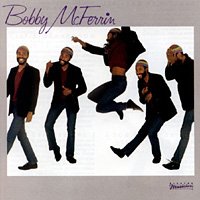Trachs: 1—Dance With Me; 2—Feline; 3—You’ve Really Got a Hold On Me (with Phoebe Snow); 4—All Feets Can Dance (anybody ‘thout feet can dance on their hands); 5—Sightless Bird; 6—Peace; 7—Jubilee; 8—Hallucinations; 9—Chicken
Release Date: 1982
Tags: Vocal, Debut Album
Rating: ★★☆☆☆
In novel-writing, there is a theory that one must prove one’s worth by writing a few formulaic novels (or, to use a more descriptive and technical term “crapola novels”) first; after having proven that one can produce mediocrity at its most pointless, there is some peculiar reasoning on the part of publishers that you will then be capable of producing a work of genius. I’ve never understood this idea, particularly when it could injure an artist to approach his art this way. By this same token, had this been the first work by Bobby McFerrin that I’d heard, I’d have dismissed him without a second thought and not gone on to enjoy his later works.
The selections aren’t bad, and his trademark “sound effects” that are used to spice up his music are here in embryonic form. It’s easy to see where his first big hit, “Don’t Worry, Be Happy” came from. The problem is that McFerrin’s true genius, as demonstrated time and time again on other albums is, on this album, buried under a ton of Let’s-Play-It-Safe.
I must risk sounding despicably racist when I refer to many cuts of this album being founded in the style of “black and blues” (as Harry Chapin called the style, in his song “There Was Only One Choice”), and I may sound no less racist by saying that any Black lounge singer playing soft barroom jazz could have recorded this album. Perhaps not “any” singer, as McFerrin’s voice shines through this otherwise tiresome material; it clearly shows the range and tonal quality that is nearly operatic in nature, not to be hidden under any bushel, yet somehow down-to-earth after all. Sadly, this unique and highly valuable quality isn’t enough to save an album that is, in a word, uninteresting.
“All Feets Can Dance,” McFerrin’s own composition, is the first time the man really breaks loose. Accompanied only by percussion, he overdubs himself a dozen or more times, providing his own percussive body-effects, vocal effects, and just-plain-fun. This technique shows up in future albums in the “for-fun” music like “Don’t Worry, Be Happy” and the brilliantly intense “Sweet in the Morning.”
“Sightless Bird,” anther of McFerrin’s compositions, is nearly swallowed whole by an attempt to create a soft-rock atmosphere in what deserves to be a gentle and deeply-felt lullaby, akin to the music that he wrote for “Stories From the Quilt.” One other cut, called “Hallucinations,” provides the listener with another glimpse of what McFerrin can do with his self-overdubbing technique; it’s quite good, although not enough to bring the rest of the album up to par.
Overall, the effect of this album is that sense of “The kid’s got potential,” which is a shame when you consider that what the kid had, even back in 1982, was a healthy overdose of genius. I’m glad to say that McFerrin managed to find a good niche in the musical world, providing us with the silly-feel-good “Don’t Worry, Be Happy” that catapulted him into the public ear. His later albums, including a collaboration with Yo-Yo Ma (Hush), have contained exceptional work. Perhaps this album should be considered a cautionary tale for artists of all stripes who have had to produce garbage first and then find some way to prove the old adage that “Talent will out.” In McFerrin’s case, I’m particularly glad that it did.

